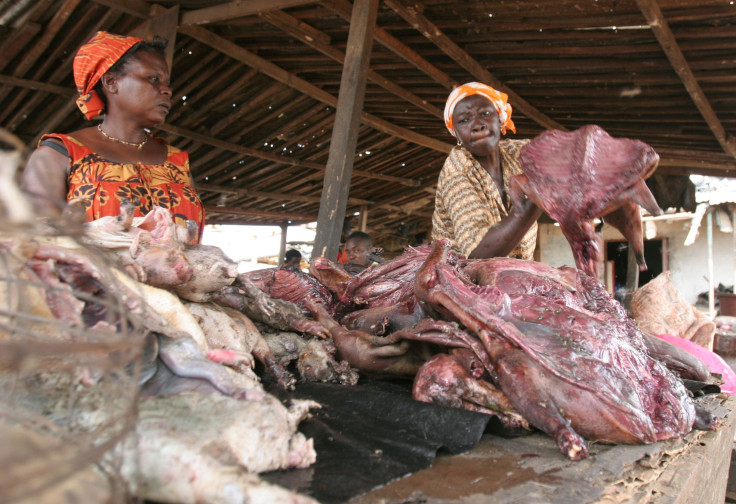Ebola Outbreak 2014: Fear Of Virus Drives Ghana’s Bush Meat Market Into The Ground

The Ebola outbreak in West Africa has slowed demand for bush meat in neighboring Ghana, a country that has never had a case of Ebola but is located about 1,000 kilometers (620 miles) from the epicenter of the epidemic in Liberia. Bush meat, a staple source of protein for many in West Africa where other sources of nutrition are often scarce, is now something to be feared after health officials raised concerns about its possible connection to the deadly disease, according to the Associated Press.
"[The outbreak] has affected business, of course," Theodor Semi, a restaurant owner in downtown Accra, the capital and largest city of Ghana, told the Associated Press. Semi said he will serve bush meat again when the outbreak is over, but in the meantime, his business “has become slow because most Ghanaians like bush meat, especially grasscutter,” a large rodent native to Africa.
Bush meat refers to meat that comes from a variety of wild animals like bats, rats and small primates and is often smoked, dried or salted. In some areas, it is a necessary source of food, the BBC reports.
After the origin of the outbreak in West Africa was traced to a child in Guinea whose family hunted and ate two species of bat known to carry the Ebola virus, health officials have advised against consuming bush meat as it could spread Ebola. Exactly how the disease is transmitted from animals to humans is unclear; however, there is evidence that people can get the virus directly from the blood and other fluids of infected animals, according to the U.S. Centers for Disease Control and Prevention. “If you know that the Ebola virus is introduced in one area, it’s probably an extra good time to stop eating bush meat,” Daniel Bausch, an associate professor of tropical medicine at Tulane University School of Public Health and Tropical Medicine in New Orleans, told the Washington Post in August.
Rebecca Ackwonu, a Ghana Health Service Commission official, said that while health officials have advised the public against eating bush meat, enforcing a ban on it is difficult because many people grew up with it and there is a long tradition in some areas of hunting bush meat. "People who eat bat bush meat are rarely aware of any potential risk associated with consumption,” Olivier Restif from the University of Cambridge, told the BBC. “They tend to see it as healthy food.”
© Copyright IBTimes 2024. All rights reserved.












